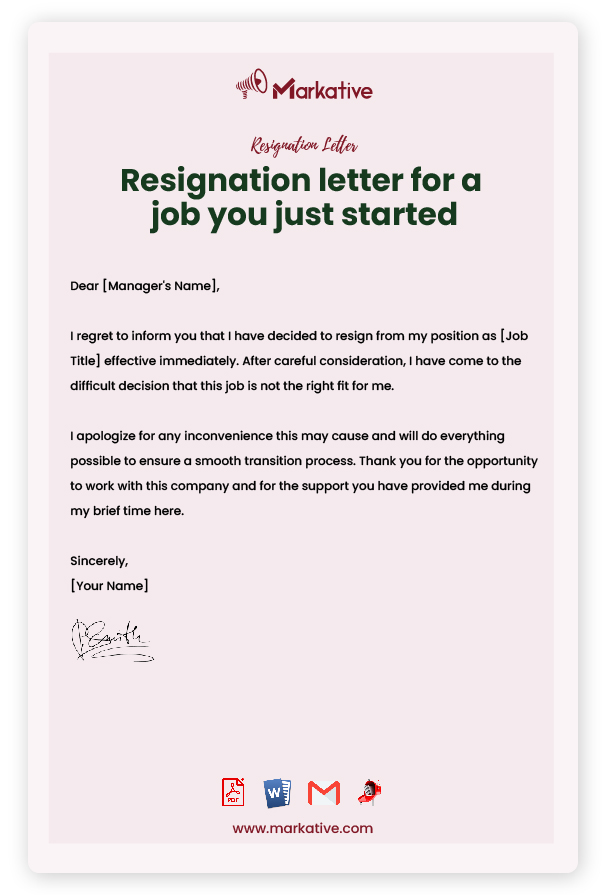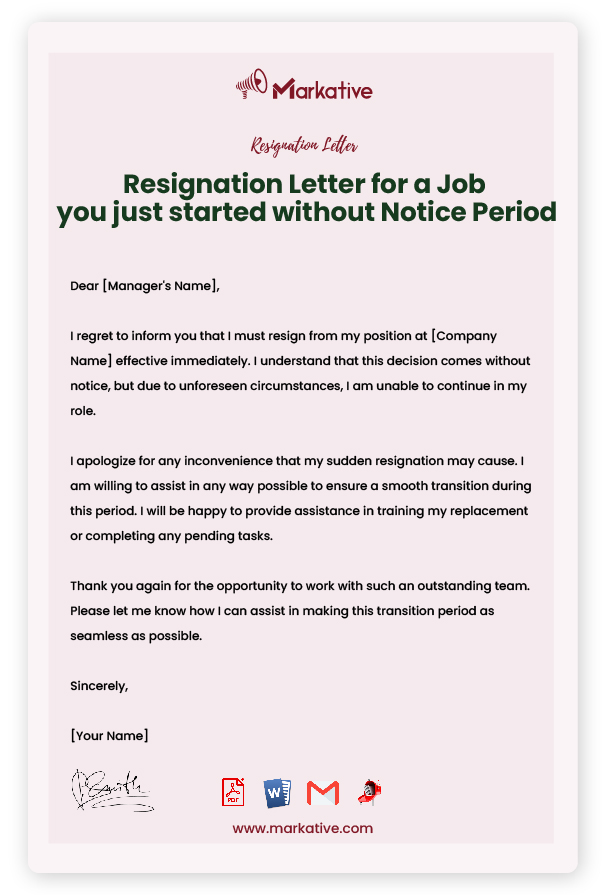Resignation Letter for a Job you just started that you’ve just started can be a challenging decision. You might have invested time and energy in getting the position, but sometimes situations arise that make it difficult to continue working. No matter the reason, submitting a well-written resignation letter is an essential step in the process. Not only does it demonstrate professionalism, but it also creates a positive impact on your future job prospects.
A resignation letter is vital because it provides an official record of your decision to leave the company. It serves as a bridge between you and your employer and helps to ensure a smooth transition. A well-written resignation letter can help you maintain a positive relationship with your employer, even if your departure is unexpected. It also provides your employer with ample time to find a replacement and make the necessary arrangements to ensure a smooth handover.
A good resignation letter can create a lasting impression that can influence your future job prospects. A poorly written letter can lead to a negative impression of you as an employee, while a well-written letter can demonstrate your professionalism and enhance your reputation. In some cases, a former employer may be contacted by a potential employer for a reference, and your resignation letter can serve as a valuable reference point.
It can demonstrate your willingness to communicate professionally, even in challenging situations, and your commitment to completing tasks to the best of your abilities. In this article, we will provide tips on how to write an impactful resignation letter, which can help you maintain positive relationships and enhance your career prospects.
How To Write Appealing Resignation Letter for a Job you just started?
Writing a resignation letter for a job you just started can be challenging, but it is important to do it professionally and gracefully. In this guide, I will provide five steps on how to write an appealing resignation letter, along with examples.
Step 1: Start with a positive tone and express gratitude Begin your letter with a positive tone and express your gratitude for the opportunity to work with the company. It is important to show that you appreciate the experience you gained during your time there.
Example: “I am grateful for the opportunity to have worked with the company for the past few weeks. I appreciate the support and guidance provided by my colleagues and supervisors during my short tenure.”
Step 2: Provide a clear reason for resignation Be honest and clear about why you have decided to resign from the job, whether it’s because of personal reasons or a better opportunity elsewhere. Avoid criticizing the company or your colleagues.
Example: “After much thought and consideration, I have decided to resign from my position due to personal reasons that require my immediate attention.”
Step 3: Offer assistance with the transition In your resignation letter, offer assistance with the transition to make things easier for the company. You can suggest a replacement or offer to train the person who will take over your responsibilities.
Example: “I will do my best to ensure a smooth transition during my remaining time here. I am willing to assist in training my replacement or provide any necessary information to ensure a seamless handover.”
Step 4: Thank your colleagues and supervisors Thank your colleagues and supervisors for their support and guidance during your time at the company. Express your appreciation for the skills and knowledge you have gained while working with them.
Example: “I would like to express my gratitude to my colleagues and supervisors for their support and guidance during my time here. I appreciate the skills and knowledge I have gained while working with such a talented team.”
Step 5: End with a positive note End your resignation letter with a positive note, wishing the company and your colleagues all the best for the future.
Example: “Thank you once again for the opportunity to work with the company. I wish the company and my colleagues all the best for the future.”
Conclusion: Writing a resignation letter for a job you just started can be challenging, but following these five steps and examples will help you write an appealing resignation letter that will leave a good impression. Remember to be professional, honest, and graceful in your letter.

Immediate Resignation Letter for a Job you just started
[Your Name] [Your Address] [City, State ZIP Code] [Email Address] [Today's Date] [Employer's Name] [Company Name] [Address] [City, State ZIP Code] Dear [Employer's Name], It is with regret that I am writing this letter to inform you of my immediate resignation from my position as [Your Job Title] at [Company Name]. I understand that this may come as a surprise, but due to unforeseen personal circumstances, I am unable to continue working at this time. I apologize for any inconvenience this may cause and I assure you that I will do everything in my power to ensure a smooth transition of my duties to my successor. I will also ensure that all outstanding work is completed and any necessary handover documentation is provided to the appropriate parties. I want to thank you and the rest of the team for the warm welcome and the opportunities that you have given me during my brief time at the company. I appreciate the skills and experience that I have gained while working with you, and I hope that we can stay in touch in the future. Please let me know if there is anything else that I can do to assist with the transition process. Once again, I apologize for any inconvenience that my resignation may cause. Thank you for your understanding. Sincerely, [Your Name]
Resignation Letter for a Job you just started with Notice Period
Dear [Manager's Name], I am writing to inform you that I have decided to resign from my position as [Job Title] at [Company Name]. It is with regret that I submit this resignation letter as I understand that I have just recently started working with the company. However, I have received an offer for a role that aligns better with my career aspirations and goals. Please note that I am willing to serve the required notice period of [Number of weeks/months] as per my employment contract. My last day of work will be on [Date]. I will ensure that I complete all my assigned tasks and handover all relevant responsibilities to my team members before my departure. I would like to express my gratitude to the management and my colleagues for the opportunity and support during my short tenure at the company. I have learned a lot during my time here and I will always cherish the experience. Please let me know if there is anything I can do to ensure a smooth transition and handover process. Thank you for your understanding. Sincerely, [Your Name]
Resignation Letter for a Job you just started without Notice Period
Dear [Manager's Name], I regret to inform you that I must resign from my position at [Company Name] effective immediately. I understand that this decision comes without notice, but due to unforeseen circumstances, I am unable to continue in my role. I would like to express my sincere gratitude to the company for providing me with this opportunity. I am grateful for the support and guidance that I have received during my brief time here. However, I have decided that it is in my best interest to step down from this position. I apologize for any inconvenience that my sudden resignation may cause. I am willing to assist in any way possible to ensure a smooth transition during this period. I will be happy to provide assistance in training my replacement or completing any pending tasks. Thank you again for the opportunity to work with such an outstanding team. Please let me know how I can assist in making this transition period as seamless as possible. Sincerely, [Your Name]
Resignation Letter for a Job you just started with Reason
Dear [Manager's Name], I am writing to inform you of my resignation from my position as [Job Title] at [Company Name], effective immediately. I understand that this may come as a surprise given that I have only recently joined the company, and for that, I apologize. After careful consideration and reflection, I have come to the difficult decision that this job is not the right fit for me at this time. Despite my excitement when I first started, I have realized that the role and responsibilities are not aligned with my career goals and personal aspirations. I want to express my sincere gratitude to you and the entire team for giving me the opportunity to work at [Company Name]. It has been an honor to be a part of such a talented and dedicated group of individuals. I have learned a great deal during my brief tenure, and I appreciate all the guidance and support that I have received. I will do everything I can to ensure a smooth transition during this period. I am committed to completing any outstanding tasks and projects that I have been working on and to assist in finding and training my replacement. Thank you again for the opportunity to work at [Company Name]. I wish you and the team all the best in your future endeavors. Sincerely, [Your Name]
Resignation Letter for a Job you just started without Reason
Dear [Manager's Name], I am writing to inform you that I am resigning from my position at [Company Name], effective immediately. I understand that this may come as a surprise, and I apologize for any inconvenience this may cause. Please know that my decision to resign is not a reflection of the company or the job itself. I appreciate the opportunity to have worked with such a talented team and to have gained valuable experience during my brief time here. I understand that my departure may cause some disruption, and I am willing to help in any way I can to ensure a smooth transition. Please let me know how I can assist with the handover of my duties. Thank you again for the opportunity to work at [Company Name]. I wish the company and my colleagues continued success. Sincerely, [Your Name]
How Much Notice Should You Give for a Resignation Letter for a Job you just started ?
According to a 2021 survey by the Bureau of Labor Statistics, the median tenure for workers in the United States was 4.1 years. This means that on average, workers stay in their jobs for just over four years before moving on to a new position. Additionally, a 2020 study by the Society for Human Resource Management found that 81% of employers have experienced difficulty in finding qualified candidates to fill open positions. This highlights the importance of retaining employees and providing ample notice when resigning.
When resigning from a job that you just started, it’s important to give as much notice as possible. The standard notice period for most positions is two weeks, but if you’ve only been in the job for a short time, it’s considerate to provide more notice if possible. Ideally, you should have a conversation with your manager as soon as you’ve made the decision to resign and work together to determine a mutually agreeable timeframe for your departure.
Be sure to provide a written resignation letter and offer to help with the transition process in any way that you can. By providing ample notice and demonstrating a commitment to a smooth transition, you can help maintain positive relationships with your employer and colleagues even as you move on to new opportunities.
Is it Ok To Email a Resignation Letter for a Job you just started?
While it’s not the most ideal scenario, it is acceptable to email a resignation letter for a job you just started if there are extenuating circumstances that make it impossible for you to provide a physical copy in person.
For example, if you’re working remotely and won’t have the opportunity to meet with your manager in person, emailing a resignation letter may be your only option.
However, it’s important to ensure that your email is professional and includes all the necessary information, such as your last day of work and a brief explanation for why you’re resigning. You may also want to follow up with a phone call to your manager to discuss your resignation and ensure that there are no questions or concerns.

Common Mistakes When Writing a Resignation Letter for a Job you just started?
- Apologizing: It’s not necessary to apologize for resigning from a job you just started. Keep your resignation letter simple and to the point, without offering excuses or apologies.
- Providing too much detail: When writing a resignation letter for a job you just started, you don’t need to provide excessive detail about why you’re leaving. Keep it brief and professional, and focus on the positive aspects of your experience.
- Burning Bridges: It’s important to maintain good relationships with your colleagues and employer, even when you’re resigning from a job you just started. Avoid burning bridges by being respectful and professional in your resignation letter.
Conclusion:
Resigning from a job that you just started can be a difficult decision, but it is important to approach it professionally and respectfully. When writing a resignation letter, be sure to include important details such as the date of your last day and a brief explanation for your departure. It is also important to send the letter to the appropriate person and at the right time. Common mistakes to avoid include being too emotional or critical, not giving enough notice, and not expressing gratitude for the opportunity.
To make the process easier, we have provided multiple free and ready-to-use resignation letter templates that you can personalize and use. Remember, leaving a job is a natural part of your career journey, and a well-written resignation letter can help you leave on good terms and maintain positive relationships with your former employer and colleagues.







